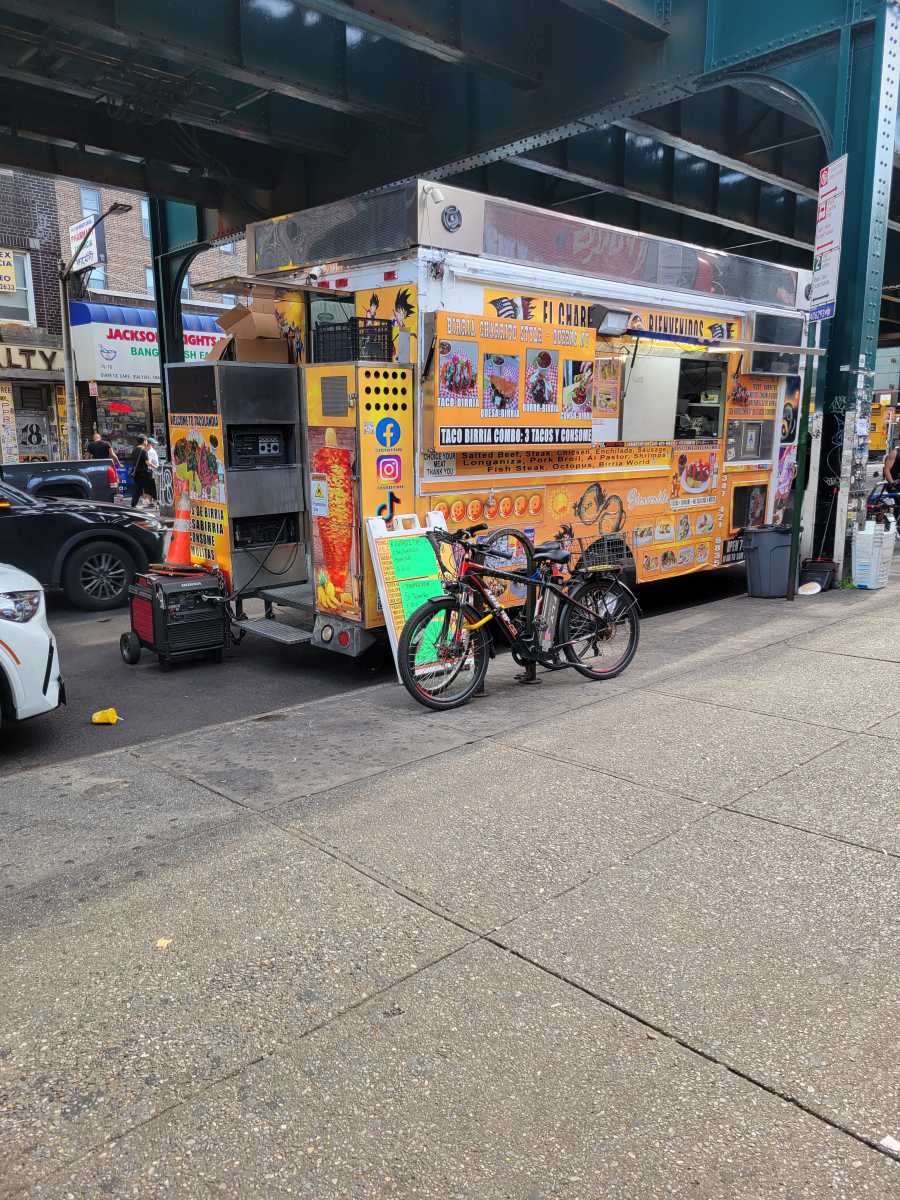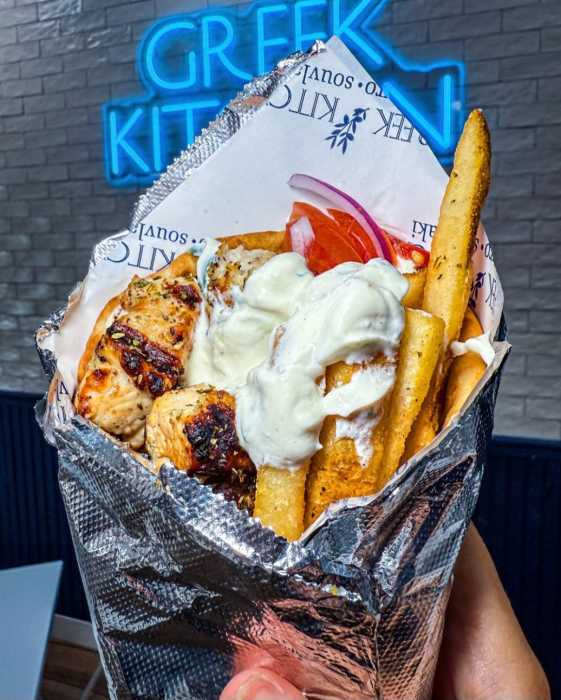In Jackson Heights at 4 p.m. on a Thursday afternoon, Roosevelt Avenue is buzzing with energy as commuters file in and out of subway cars and onto the street and cars and trucks grapple to get down the busy road. The street is filled with rows of shops and restaurants, along with food carts, street vendors and food trucks along the avenue. The almost-but-not-quite the weekend lag leaves hungry commuters faced with another choice to make throughout their day and the array of food truck options in busy areas like Jackson Heights offers customers convenience and delicious food without breaking the bank, two features that can feel vital, particularly with rising costs of living and pressure from inflation.
The feeling is something both consumers and business owners have been feeling in their wallets, particularly small business owners who are still feeling the financial aftershocks from the pandemic. With consumers feeling the squeeze in their wallets and decision burnout, food trucks offer a delicious and quick option; however, as customers ponder what’s best for their budget, the seemingly innocuous choice has the potential to create a larger effect in the community over time.
“I like going to this truck, I honestly never considered it to be like picking one over the other [when it comes to restaurants],” said Brandon M., who lives in the area. “It’s really good food, it’s authentic, family-run; to me it’s not about the price, but it’s definitely a bonus.”
‘Everybody has to make a living’
With so much at stake, some business owners throughout the borough feel that the presence of food trucks is taking away from business, along with the idea that brick-and-mortar business owners are committed to their location, for better or worse. The topic has dominated local BID meetings, leaving some owners wondering if the trucks are making business more challenging, particularly in an era of inflation, with some customers opting for more budget-friendly choices.
“It varies based on the vendors,” said Leslie Ramos, the executive director of the 82nd Street Partnership. “Usually, they don’t like the large vendors, especially if it’s close to a restaurant selling similar food, because they feel it takes access away or blocks the view to their location, especially if people are driving by or going across the street. The other thing that I constantly hear from small businesses is that they feel that it isn’t fair competition, since they have to pay rent, insurance, utilities and their day to day operating cost is really high, including staffing cost and so they feel that the street vendors, take away from their ability to survive, because they take business away.”
According to a July 2025 study by the NYC Comptroller’s office, even years later, the economy is still not where it was before the pandemic or where it would have been had the pandemic not occurred. Pairing that factor with increased prices from tariffs on food and supplies for business owners, and a struggling job market in 2025, according to the U.S Bureau of Labor Statistics, it’s no wonder business owners along the street are feeling increased pressure and a sense of competition from food trucks that visit the neighborhood throughout the week.

“Everybody has to make a living, and I understand that,” said Diego Valencia, who owns Mr. Pollo, a Colombian restaurant in Bayside and another restaurant in Jackson Heights. “This affects our store in Jackson Heights more, because we don’t have as many food carts [in Bayside] as we do over there, but it does still affect us here because we pay rent. As a customer, if I could get a burger for $5 instead of getting it in the restaurant for $10, I’m going to grab the $5 one, right? And I understand there’s a hustle for everything, but in a busy area, there has to be somewhere else where there’s not so much traffic of restaurants where [food trucks] can go, because they have to make a living as well.”
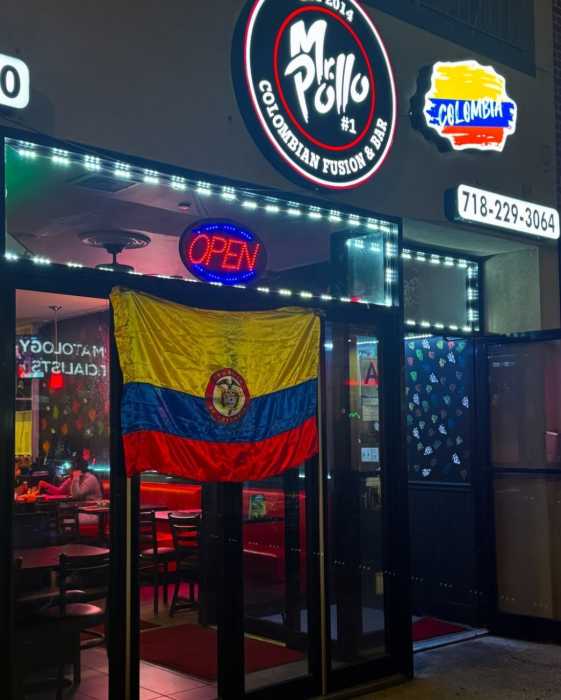
In Queens, the cost of rent for a small business can range anywhere from approximately $14,000-$23,000 a month, not including the cost of utilities, like electricity, gas, and water, which can range from about $2,000-$5,000 a month. The cost of air conditioning during hotter months can add on at least $3,000 as well, along with the cost of food and drink, and labor, which varies depending on how many employees an establishment has.
“In the summer, the air conditioning is on all day, so your bill is coming for at least $4-5,000, and the question is, are you making those extra $5,000 to pay?” asked Valencia. “Going food shopping for the restaurants, you’re spending at least two grand. People with liquor licenses, every order is at least $3,000, and that’s what a lot of people might not understand. I can’t give you something for $12 that you might be able to get on the corner. They’re trying to save money, and I understand that, but because they have that choice, that’s where it becomes a problem.”
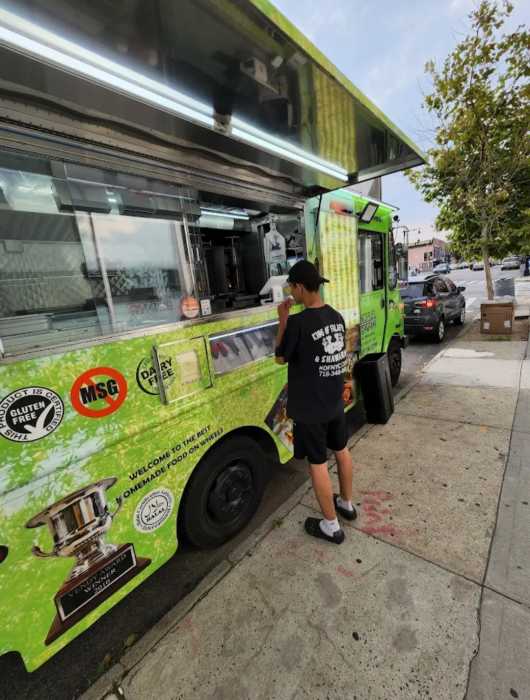
Still, the notion that food truck owners get off scot-free each month and don’t bear a financial burden simply isn’t true, according to Nidal Zeideia, who runs King of Falafel and Shawarma, a family business that his father, Freddy Zeideia, first started as a food cart in 2002 in Astoria before expanding to a storefront and three trucks throughout the city. The well-known brand sells authentic Halal Palestinian cuisine, which his father sought to bring to New Yorkers when he first started his business. The brand presently has a food truck that sits on Bell Boulevard in Bayside, along with one in East Elmhurst, and another on Park Avenue in Manhattan. While food trucks don’t pay rent, the businesses are not immune to financial struggles and challenges. Zeideia has said he also deals with nearby storefronts on Bell Boulevard that call the Department of Sanitation and the NYC Department of Health in hopes of getting him fined.
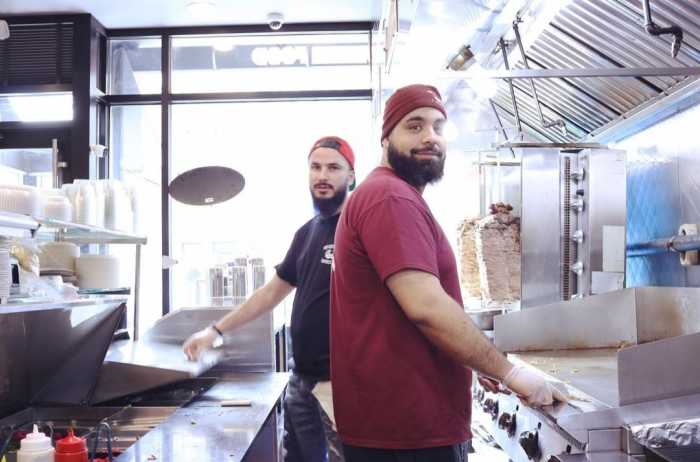
“People don’t understand, they think it’s easy, when it’s busy everybody’s busy, when it’s slow everybody’s slow,” said Zeideia. “We have a shop [in Astoria] that has three food trucks open next to us, and we don’t bother anybody. Some weeks we don’t make money, I don’t make my salary, but I pay my guys, and I’m here with them all day.”
While food trucks aren’t the same as a storefront, they still pay for the cost of food and supplies, wages for their employees, garage fees for their trucks, along with long hours in a small space, and slower business in colder months and bad weather. Costs vary monthly and even seasonally, including a monthly lease or loan payment for the truck, which varies from $2,000-$3,000 a month, fuel and propane, which can range anywhere from $500 to $1,500 per month, and maintenance and repairs on the truck that can cost anywhere from $500 to $750 a month. Food and drink runs from $1000 to $5000 per month, as well as commissary fees in NYC that cost $500-1500 a month, garages for trucks, which run from $3000 and up depending on how many trucks a business owns, and labor to pay employees.
“The food truck industry in New York has become part of the community,” said Zeideia. “Let’s say on a pita, if I sell it for $10 and I make $1 or $1.50 on it, when they sell it for $15 or $16 and they say, well, they have to pay tax-we all pay it. They have five or six employees, we have four employees.”
‘There should be an even playing field’
While food truck and storefront owners certainly have a mix of similar and different financial and logistical challenges throughout their day, property owners can also feel the squeeze with only so much space in such a busy city, and when trucks or food carts park nearby or on the sidewalk, it can certainly be unclear what is permitted or not. According to NYC.gov, when it comes to pushcarts, they must be on a sidewalk that’s at least 12 feet wide, and the unit must be set up within 6-12 inches of the curb, and at least 10 feet from any crosswalk, driveway, or subway entrance/exit. The mobile food unit also has to be at least 20 feet from a building’s entrance or exit. In terms of food trucks and vehicles, owners must obey the same placement regulations as mobile food vending carts, and the truck needs to have a current Department of Motor Vehicles registration, an inspection sticker, and insurance. Additionally, the trucks are not allowed to vend at parking meters, and the engines are not allowed to idle.
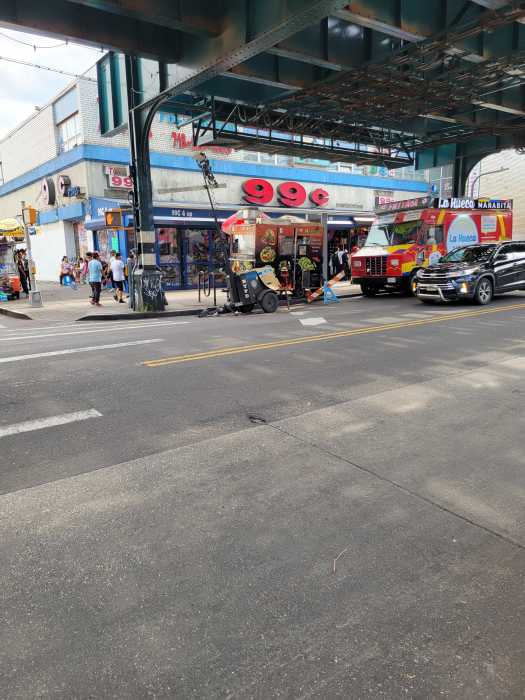
“A lot of businesses rely on customers that come from outside of the neighborhood, and I’m not just talking about 82nd Street, but in general,” said Ramos. “On 82nd Street, our biggest issue is that street vendors are parked all day, so it makes it very difficult for customers to find a spot, and that also creates a huge traffic jam flowing down. There are also issues with cleanliness, and who’s responsible for maintaining the sidewalks and keeping them clean. In general, our small businesses support vendors, but they support limited balanced numbers, not these unrestricted numbers.”
In nearby Flushing, a piece of legislation, Int 0969, was passed in 2018 by City Council Member Peter Koo, prohibiting street vendors and obstructions on certain streets in Downtown Flushing for the purpose of allowing more access and space for pedestrians to pass after nine feet of widened sidewalk space on Main Street was expanded, which led to an increase in street vending of all kinds. According to Noah Sheroff, the executive director of the Bayside BID, he has been in talks with NYC Small Business Services and Council Member Vickie Paladino’s office to seeking legislation that would be similar, but with the intention to place storeowners in the neighborhood as a priority for their businesses over the food truck vendors, which may even include having them set up shop away from BID areas. Sheroff and BID members feel there are plenty of other spaces throughout northeast Queens and beyond where food trucks and other vendors can flourish without being so near to restaurants and other businesses along Bell Blvd.

According to Sheroff, the topic is definitely nuanced, particularly in a struggling economy where everyone is just trying to survive. Sheroff has been the executive director of the Bayside BID since January 2024, often working with his team and small businesses in the area to help promote them through events, community outreach, meetings, and workshops. He also personally maintains a rapport with business owners in the BID along with elected officials and community leaders in the area.
When he first joined the BID, the topic of food trucks was brought to his attention almost immediately, including during an annual meeting for the prior fiscal year 2023. Sheroff said the topic dominated a good portion of the meeting, particularly food trucks that come and go throughout the week and sell similar items at a discounted price to what storefronts in the area are selling.
“I understand that everyone is trying to make a living,” said Sheroff. “This can be a struggle; New York City is expensive, and it’s tough to make it here. I have no hatred towards the food trucks, but I think there should be an even playing field in terms of what’s allowed, given the cost, particularly those overhead costs that brick and mortar businesses face.”
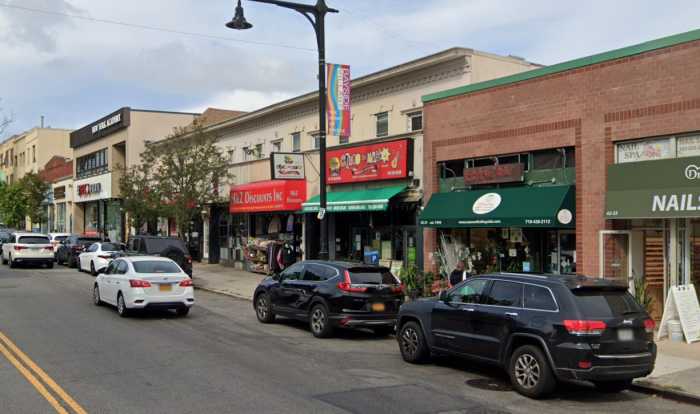
‘How does the city allow that?’
According to John Bonavita, who has been a commercial property owner in Bayside for well over 12 years, a Jamaican food cart visits the neighborhood every Saturday and Sunday and parks their food cart right on the sidewalk and create billowing smoke, which impacts a tenant with lung issues. According to Bonavita, the issue is not that simple to resolve anymore. In the past, he said it would usually be a matter of calling the 111th Precinct, who would quickly come over and deal with the issue. However, since April 2023, food truck complaints are now handled by the NYC Dept. of Sanitation, who, according to Bonavita, eventually come to the site; however, it’s generally by midweek, making the issue difficult to resolve, since the weekend food cart is long gone by then. Bonavita has been frustrated with the issue for some time now because it would appear there’s no one to enforce the laws or resolve the long-standing issue.
“They pull these trailers that have ovens and fans, and then they put up ropes like it’s a red carpet on the sidewalk,” said Bonavita. “It’s ridiculous, and it’s like, how does the city allow that? If something breaks, I have to replace it, I have to file for a permit, and then I have to get it signed off. When it snows, I have to clean the snow and melt the ice, and then these guys just come like they’re owners and drive their truck right onto the sidewalk, do their business, and then leave, and they’re infringing on my tenant who pays a nice rent.”
Although the Department of Sanitation may not be equipped to respond immediately, Sheroff mentioned that calls to 311 definitely make a difference over time.
“This is a data-driven city, so if there are a lot of complaints about a particular issue, that usually prompts a more forceful response from the agency, so to speak, so I think there are some opportunities with 311,” said Sheroff.
According to Ramos the city could solve a lot of the tension and issues between food truck vendors and storefronts if they have more of a hand in where trucks set up, how adjacent it is to similar store fronts, and let food trucks spread out more evenly throughout the borough instead of being clustered in one main area, such as 82nd Street in Jackson Heights in order for everyone to make a living without overstepping on each other’s personal space.
“The city needs to establish zoning requirements and identify the locations, and I think the city can absorb all the vending that we have [on 82nd St.] and spread it evenly across the city,” said Ramos. “That would be extremely helpful for the vendor and for the small businesses, because then they can determine where they decide to rent and what type of goods they can sell. When it comes to the size of the vendor, [the city can] make sure that they are following the rules. Vendors are taking up very large spaces, setting up multiple tables, setting up tents, and that is the primary reason where conflict starts between the businesses and the vendors.”
Presently, it’s hard to say for certain how many food trucks there are in NYC, as licenses are difficult to maintain and there is presently a wait list with over 10,000 applicants on it with an estimated 10-year wait, which has cultivated a black market for food truck licenses over the years. According to the NYC Food Policy Center, the number of year-round mobile food vending permits is limited by law. The number was capped at about 5,100 permits for both food carts and trucks. In 2022, a new law was passed in order to address the black market by issuing 445 new “supervisory” licenses each year for 10 years. However, the rollout has been slow, and the wait list has been yet another challenge in operating a food truck in NYC.
“I think that the city needs to be more creative in how it accommodates vendors in the community,” said Ramos. “There’s plenty of examples in the neighborhood where businesses are co-locating out of storefronts where previous vendors were selling.”
Ramos also believes that a program can be created for entrepreneurs in order to give them a path to transition from a food truck to a storefront over time, in order to reduce so much congestion and leave food trucks for those who have more of a financial need or don’t have other options.
“The city should be creating a path for vendors to move from the street to brick and mortar and limit the number of establishments that any particular street vendor can have throughout the city,” said Ramos. “I think vending should be for people who are starting up or who have no other options, and they should make sure that there’s not large street vending enterprises, because those are taking away from small businesses as well as the street vendors who really need and rely on starting up their business on the streets of New York.”
Though the main sentiment among business owners is that anyone is more than welcome to try to make a living in the community, ideally, an ultimate plan is for any food trucks to find elsewhere in the neighborhood to pick a spot to flourish.
“It’s something that we’re definitely working on,” said Sheroff. “We had a meeting with the Department of Small Business Services, which also oversees the BIDs, about possible solutions to deal with this, and there’s potential for legislation.”

